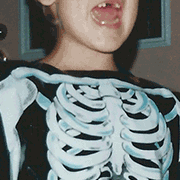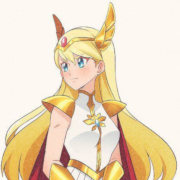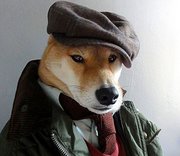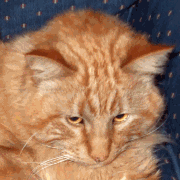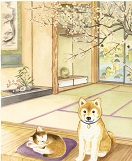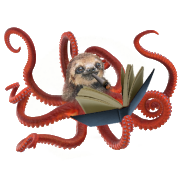|
cda posted:Generally speaking, books that survive are books that manage to embed themselves in cultural or actual institutions of some kind, to the point that they become seen as an integral part of that institution. The Bible is of course an obvious example: the only reason most people still read it is because it's part of religious institutions that actively promote reading it. That's true for a lot of books that people pretty much only read in elementary or high school as well. Children's literature as a whole happens to demonstrate this very clearly at the present time because public schooling is one of the only really universal* institutions we still have, and literacy is a direct part of the mission of those schools, so the institutional bond is very strong. But the bond is also strong with "institutions" which are just social in nature, such as parenting: from even before the baby is born, there are books which are considered part of parenting as an institution. Some of them, like What to Expect When You're Expecting or Dr. Spock, are not children's books, but a whole heck of a lot of them are. These books are not, strictly speaking, canonical, in the sense that they are not necessarily great literature or seen as great literature. Instead they're talismans. They provide an object, a text, into which powerful emotions are cathected. so i am a weird dude rite, and as such, i place a lotta importance in the power of belief. i own so many "totemic" items it's not even funny. i wear my grandfathers shirts, my great grandfathers jacket, my fathers pants. there is power to lineage, and this power, when concentrated and codified is extremely powerful. the lord of the rings shaped my fathers mind. his mind shaped my world, and i read the book that helped shape the mind that shaped my world, and then grew, and shaped my own world, doubly influenced by text.
|
|
|
|

|
| # ? Apr 25, 2024 11:27 |
|
cda posted:!!! Which ones. I believe between the two of us: The Headless Cupid, The Velvet Room, Season of Ponies, and Black And Blue Magic.
|
|
|
|
xcheopis posted:I believe between the two of us: The Headless Cupid, The Velvet Room, Season of Ponies, and Black And Blue Magic. The Headless Cupid was my favorite. Really good book.
|
|
|
|
cda posted:The Headless Cupid was my favorite. Really good book. Black and Blue Magic is mine, since it takes place in San Francisco. I should find what box those are in and re-read them
|
|
|
|
cda posted:BYOB poster HappyKitty wrote a real good essay about Philip Pullman, Geography, Imperialism, and the residential school system in Canada. It just covered Golden Compass iirc though. Weird, somebody just requested that article from me on ResearchGate like, a few days ago! OH GOD A GOON IS GOING TO KNOW MY REAL NAME NOW I JUST KNOW IT Edit to make this less of a shitpost: It might be a bit of a spicy take, but a Catholic analogue of the British Empire snatching children (usually from marginalized communities) and sticking them in institutions in the far North of the world so that they can "fix" them and make them good productive Christians - especially when those responsible for it (Mrs Coulter) would balk at the idea of putting one of their own kids in such an institution - and the public has general support of the project so long as it's done on "undesirable" children, and where the people running the institutions keep knowledge of exactly what goes on and how many kids die from it far from the public eye - kinda, sorta, maybe, just a bit, seems like you got yourself an analogue for residential schools. I don't claim that Pullman set out to make that part of his allegory deliberately; I would, in fact, be pleasantly surprised if I discovered it was on his radar at all (I didn't see it in any interviews or anything). What I do claim is that Pullman, because he is invoking the Imperialist spirit of those "Boy's Own Paper"-style adventure narratives that formed the bulk of late nineteenth-century novels for boys in the British Empire, will inevitably end up having to also create a British Empire to justify the fact that Lyra is able to have her own "plucky British child travels to the margins of the world and also fixes the problems of the backwards noble savages (who here are bears rather than actual-rear end people)" adventure. And if you create an Empire that has an imperialist mindset, then you have to expect some patronizing attempts to "enlighten" the marginalized people of that empire. Pullman understands imperialism pretty frigging well when his imaginary empire ends up doing things eerily similar to what the actual British empire did, and for some really similar reasons, and with really similar justifications. HappyKitty fucked around with this message at 22:08 on Nov 16, 2019 |
|
|
|
HappyKitty posted:Weird, somebody just requested that article from me on ResearchGate like, a few days ago! i need to think about this post. also tho i think that the idea that he wrote it as like a gnostic response to the christian mythos of the chronicles of narnia is a thing. i haven't read that series since i was a teenager, but i remember that being a thing. also, the alien dudes in the amber spyglass who evolved to use wheels to traverse their environment is so loving cool. animorphs had a similar alien species that had developed biowheels for locomotion but it was a lot clumsier there, but i haven't read animoprhs since before i was a teenager.
|
|
|
|
I've been working my way through the very hungry caterpillar. I'm really enjoying. The main character's super-relatable because I'm also always hungry.
|
|
|
|
I got around to rereading Krindlekrax a few months ago, a book for younger readers which is obvious as most of the characters are very one note in a way that makes them kind of annoying to be honest. However, the main character, Ruskin Splinter, owns completely. He's a scrawny little twerp that no one takes seriously with a whispy voice that's barely audible, but he's the only member of his community with any balls, outside of an old man who is his only friend. He's the only one who is willing to stand up to the neighborhood bully, who's such a twat that even the adults are scared of him since his massive growth spurt, even though the bully can and will physically overpower him. Ruskin just doesn't give a gently caress. The bully and his crony were also friends with Ruskin before the growth spurt, it kind of brought out the worst in him. Also when the truth comes out about the titular crocodile, which is the size of a small bus, and why it got so big and then the old man is frightened to death by the crocodile, Ruskin get's really pissed off at everyone who's carelessness allowed the crocodile to happen, and publicly calls out the whole town, including his parents. It's a pretty badass moment in the story, and Ruskin then goes on to top it later. He's a great character in a sea of bad one-joke characters. It also helps that he's overall a Very Nice Boy. It's only when pushed that he bites back. And he bites hard when it comes down to it by the end.
|
|
|
|
BIG FLUFFY DOG posted:I've been working my way through the very hungry caterpillar. I'm really enjoying. The main character's super-relatable because I'm also always hungry. Thank you, however this book seems a bit advanced for me to begin with, are any of his other works more straightforward?
|
|
|
|
A human heart posted:Thank you, however this book seems a bit advanced for me to begin with, are any of his other works more straightforward?
|
|
|
|
The Hungry Caterpillar owns. I wish I had time to explain why
|
|
|
|
I wrote a dissertation on it but it got eaten.
|
|
|
|
Why is every thread in this forum about children's genre fiction? Why does every book literally have to have a caterpillar?
|
|
|
|
Shibawanko posted:Why is every thread in this forum about children's genre fiction? Why does every book literally have to have a caterpillar? real life has caterpillars okay
|
|
|
|
the very hungry caterpillar is a great book and a must-have for anyone with a child. the other two must-have picture books that spring to mind are the rainbow fish and the velveteen rabbit. the rainbow fish even has a gently communist message delivered in an exquisitely tactile way
|
|
|
|
cda posted:The Hungry Caterpillar owns. I wish I had time to explain why For starters, the twist is absolutely fantastic. I was on the edge of my seat and I never saw it coming.
|
|
|
|
BIG FLUFFY DOG posted:For starters, the twist is absolutely fantastic. I was on the edge of my seat and I never saw it coming. Books with real holes in them are cool. Here's one from the 1912, Peter Newell's The Rocket Book. Here's the cover:  an interesting thing to note is that the cover states that the book was *patented* in 1912. Does that mean that this is the very first book with a hole in it? I find that hard to believe because publishers have always used children's literature to experiment with the form of the book, but it would be interested to see what precisely was patented. I bet a dive into the US Patent Office archives would find the answer, so maybe I'll do that at some point. These pictures are from the Library of Congress' Rare Books division btw. If you ever happen to be in DC and want to do something cool for an hour or so, the Library of Congress has a children's literature library and rare books room that you can visit, and the rare books room has some wonderful items on display (and you can look at more if you request them in advance). Anyway, The premise is that a firework gets set off in the basement of an apartment building and it shoots up through all the floors. The illustrations are super good, imo   here's the first flat:   here's the sixth:  
|
|
|
|
animorphs
|
|
|
|
As a kid in Australia I always loved books by Dick Roughsey, an Aboriginal Australian author and artist, and his collaborator and friend Percy Trezise. My absolute favourite was probably The giant Devil Dingo  But all of his stuff is really good and that art has an amazing style.
|
|
|
|
Stoner Sloth posted:As a kid in Australia I always loved books by Dick Roughsey, an Aboriginal Australian author and artist, and his collaborator and friend Percy Trezise. Holy poo poo that cover is terrifying
|
|
|
|
Wow, this guy is really good. Thank you for bringing him up! I don't know anything about Australian children's literature. I guess I just assumed like a total dumb rear end that it was mostly British/American literature. What are some other Aussie classics?
|
|
|
|

|
| # ? Apr 25, 2024 11:27 |
|
No worries mate, here's a pic from another of his books as a bonus!  As for other Australian children's books... yeah we did get a lot of stuff from the UK and the US but there's definitely some home grown stuff that's quite good. Mem Fox's books are considered classic - starting with Possum Magic. Highly recommend Graeme Base's works starting with 'Animalia' - they're very visual and quite beautiful. For older stuff 'The Magic Pudding' (Norman Lindsay, 1918) was amazing for it's time and the title is still used in Australian politics as a phrase to describe plans relying on spending money that you don't have. Also 'Gumnut Babies' (May Gibbs, 1916) is another classic set of children's stories from that period that has held up well and is still widely known. Stoner Sloth fucked around with this message at 11:45 on Dec 4, 2019 |
|
|



